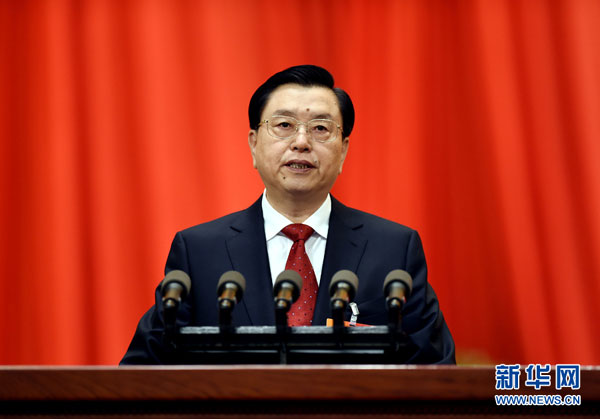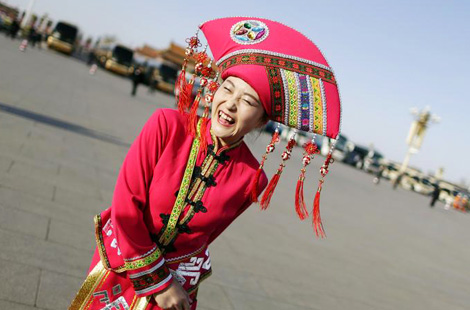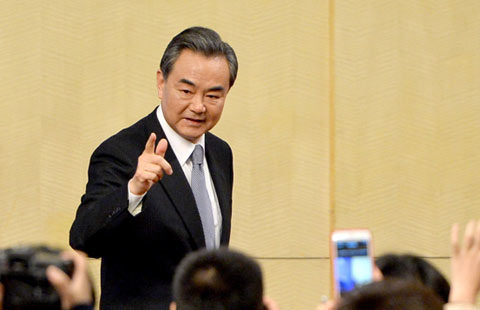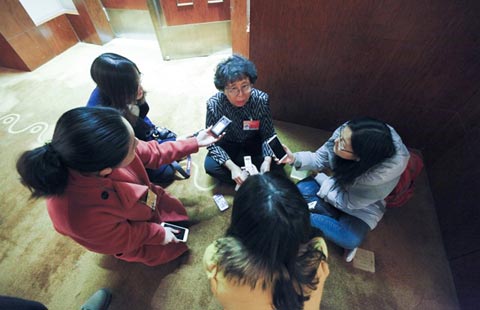China to speed up drafting anti-corruption law
Updated: 2015-03-08 16:19
(Xinhua)
|
||||||||
 |
|
China's top legislator Zhang Dejiang delivers a work report at a a plenary meeting of theNational People's Congress' annual session in Beijing March 8, 2014.[Photo/Xinhua] |
Top legislator delivers NPC Standing Committee work report
BEIJING - China plans to develop national legislation to fight corruption, according to a report delivered by top legislator Zhang Dejiang Sunday.
The country will also work out revisions to the Law on Administrative Supervision, said Zhang, chairman of the National People's Congress (NPC) Standing Committee, while delivering a work report at the annual session of the top legislature.
Making an anti-graft law is in line with a decision on rule of law adopted by the Communist Party of China Central Committee in October last year.
The anti-graft legislation should be introduced as quickly as possible and the system of sanctions and prevention improved with the goal being a mechanism which means "officials dare not, cannot and do not want to be corrupt," according to the decision.
The top legislature is mulling imposing harsher punishment on those committing crimes of embezzlement and bribery.
Criteria for imposing penalties on criminals found guilty of corruption and bribes would be modified. Heavier penalties will be imposed on those offering bribes, according to a draft amendment to the Criminal Law submitted to the NPC Standing Committee for a first reading in October last year.
The plan for making an anti-corruption law is part of the NPC's efforts to advance legislation in key areas to promote economic and social development.
China will improve legislation on democracy, which includes revisions of the Electoral Law for the National People's Congress and Local People's Congresses, the Organic Law of the Local People's Congresses and Local People's Governments, the Law on Deputies to the National People's Congress and Deputies to Local People's Congresses, and the Law on Administrative Review.
Legislation concerning social issues, such as community correction, anti-domestic violence, traditional Chinese medicine, charity and food safety, will be pushed forward, Zhang said in the report.
The country will also advance legislation concerning cultural, educational and ecological issues.
Also included in the legislation plan are a national security law, an anti-terrorism law, a law on the management of international NGOs in China, and a cyber-security law, Zhang said.

 Apple unveiled 1st wearable watch
Apple unveiled 1st wearable watch
 Children perform 'Ballad of Mulan' in NYC
Children perform 'Ballad of Mulan' in NYC
 Rally in New York supports indicted Chinese-American police officer
Rally in New York supports indicted Chinese-American police officer
 Traditional villages: Home of Chinese culture
Traditional villages: Home of Chinese culture
 Daily snapshots of 'two sessions' - March 8
Daily snapshots of 'two sessions' - March 8
 Brazilian soccer stars prosper in China
Brazilian soccer stars prosper in China
 Chinese FM gives press conference for NPC session
Chinese FM gives press conference for NPC session
 One Minute: 'Bizarre' TV scenes and subsidies for hiring women
One Minute: 'Bizarre' TV scenes and subsidies for hiring women
Most Viewed
Editor's Picks

|

|

|

|

|

|
Today's Top News
US slaps tougher sanctions on Venezuelan officials
Xiaomi to enter bullish Brazilian market
Clinton remains silent as questions mount over email scandal
Prince Charles, Camilla to visit Washington-area sites
China, US should look forward with sincerity
China in TPP 'a good thing': ex-Rep
University of Virginia opens office in China
China to stricly regulate e-commerce industry
US Weekly

|

|







